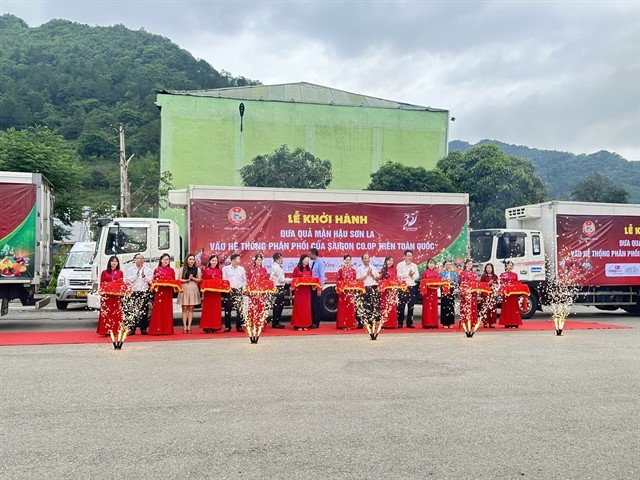The Saigon Union of Trading Cooperatives (Saigon Co.op) plans to distribute 100 tonnes of Sơn La Province’s mận hậu (plums), a unique fruit grown in the northern province.

The Saigon Union of Trading Cooperatives (Saigon Co.op) plans to distribute 100 tonnes of Sơn La Province’s mận hậu (plums), a unique fruit grown in the northern province.
The province People's Committee and Saigon Co.op held a ceremony on Sunday in Mộc Châu District to mark the fruit’s entry into the latter’s distribution system.
The fruits were bought directly from farmers in Mộc Châu and Yên Châu districts and transported by specialised vehicles for distribution at Co.opmart, Co.opXtra, Co.op Food, Finelife, and Co.op Smile nationwide.
They will be displayed at prime places and there will be product sampling from May 24 to June 1 nationwide.
Saigon Co.op has also agreed to buy other Sơn La specialties such as peaches, mangoes, avocados, and items made under the national “One Commune, One Product” (OCOP) programme.
Nguyễn Thành Công, Vice Chairman of the People's Committee said the purchase of the fruit by the co-operative and its promotion would "make the province’s plum products increasingly popular with a large number of customers … and raise the plums’ brand and value.”
Võ Trần Ngọc, Saigon Co.op’s Sales Director, said: “Saigon Co.op will reduce its profit margin to ensure maximum benefits for farmers. The plums bought by Saigon Co.op meet VietGAP standards, have food hygiene and safety certification, and are of high quality. Saigon Co.op has promotion programmes such as a fruit festival and a green consumption campaign to boost consumption of the plums and other Sơn La farm produce.”
The province has 12,400 hectares under the fruit and Sơn La plum was granted a trademark in 2021.
The plums meet strict standards like using organic fertilisers, not having pathogens or pesticide residues, having clear origin, and getting irradiated against parasites.
They are also processed into other products such as jams and syrups and soft dried and dried plums. — VNS
- Tags
- Saigon Co.op
- Sơn La plum





